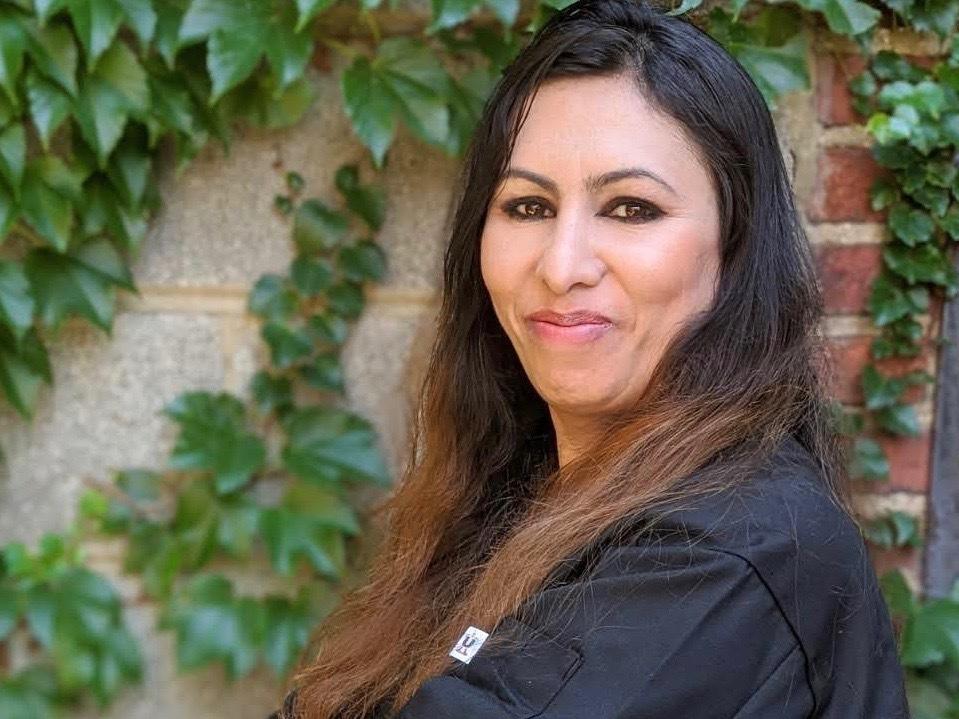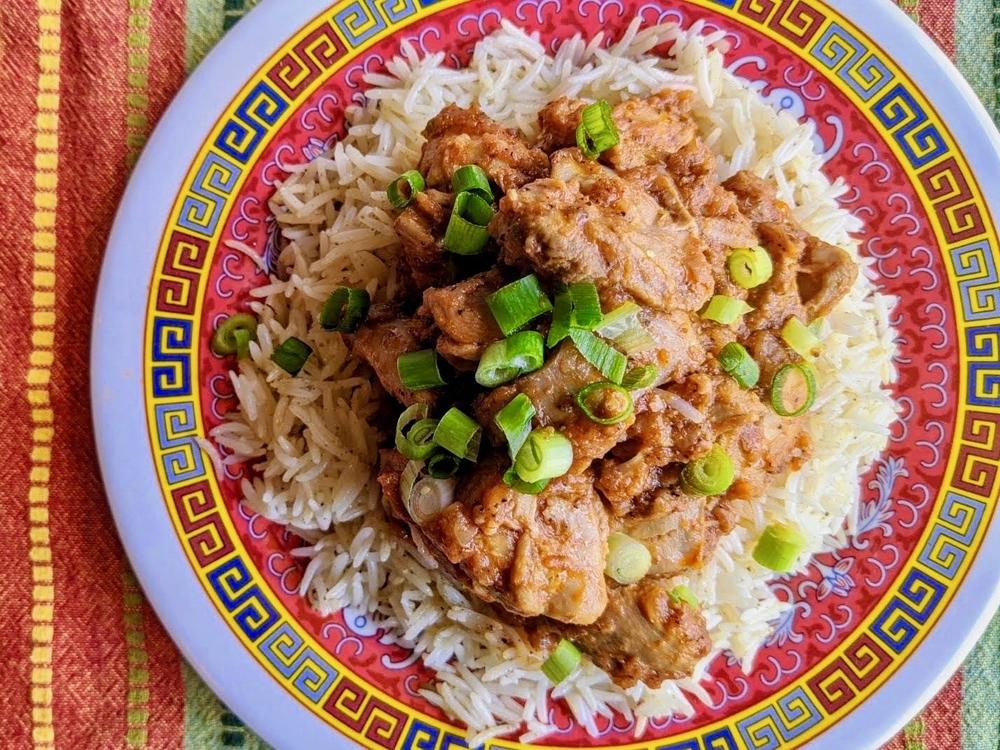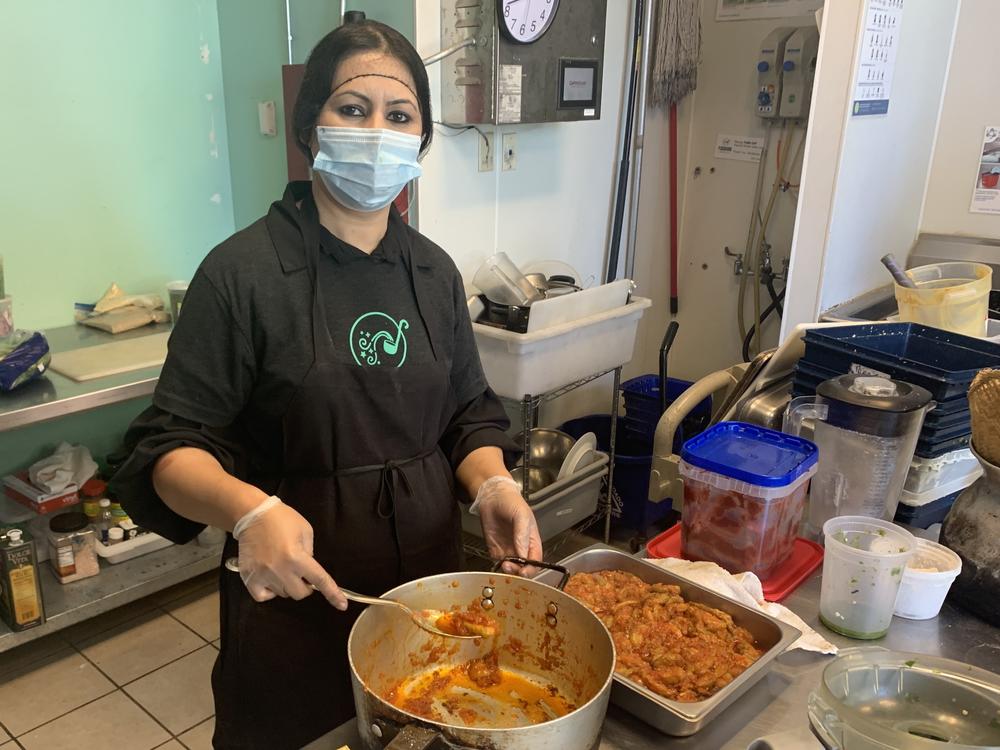Section Branding
Header Content
She barely made it out of Kabul. Now she's welcoming Afghans with a familiar meal.
Primary Content
Zainab distinctly remembers her first meal in the U.S. — and not in a good way.
"They brought us rice, and there was a kind of meat on it, and it was thin like paper," she said, struggling to explain the concept of deli meat in Dari through an interpreter. "I didn't eat it," she added, laughing.
Now it's her job to make sure newly arriving Afghans will have better memories of their first meals.
Zainab is a chef at Foodhini, a delivery-only restaurant in Washington, D.C., that features the cooking of refugees and immigrants. As tens of thousands of Afghans begin resettling in communities across the country, Foodhini is offering "welcome meals" that are donated by customers to support newly arriving families.
On a recent morning in the restaurant's kitchen, Zainab poured crushed tomatoes into a giant pan of sizzling oil and onions. She was making a bean dish called lubya, one of many Afghan dishes she learned from her mother as a teenager in Kabul, where she often cooked for her parents and seven siblings.
Now Zainab is preparing some of those same dishes for Afghans who are resettling in the region.
"I am very happy to be able to help them," she told NPR. "I am happy that they are safe here."
That's a feeling Zainab knows well, after barely escaping from Afghanistan herself.
She left the country two years ago, along with her husband and teenage daughter. He had worked for the U.S. Army in Kabul, which made him eligible for a Special Immigrant Visa.
They left many relatives behind. And they're worried about retaliation from the Taliban, so they asked us not to use their last name.
Zainab's family settled in Maryland, just outside Washington D.C., and started building a new life. She had worked in restaurant kitchens before she left Kabul. That helped her get a job at Foodhini.
But she still misses her parents.
"I think I won't be able to see my parents again. It makes me really sad. If the Taliban rule Afghanistan, I won't be able to go there," she said.
In June, Zainab and her family decided to go back to visit her parents in Afghanistan, knowing it might be their last chance for a long time. They bought return tickets for August, but never got to use them. Their flight was cancelled when the Taliban swept into Kabul.
Zainab was stranded, along with her husband and 16-year-old daughter.
"I felt bad because my daughter was crying a lot, she wouldn't eat, she told me: It was you who brought me to Afghanistan, and now we have to stay here and the Taliban would not let me go to school. And I can't leave the house," Zainab said.
The family tried to get to the Kabul airport, but the violence and chaos outside the gates drove them back. Meanwhile, Zainab's employers and her aunt in the United States were calling everyone they could think of, trying desperately to get her family out.
Finally, Zainab heard from the U.S. Embassy. She and her family were directed to a helicopter, which flew them over the gates and into the airport, where they boarded a giant military plane along with hundreds of other Afghans fleeing the country.
"Some people on the plane were crying because they were separated from their family members, as their family members were still in Afghanistan," Zainab said. "Some were quiet all by themselves."
Now Zainab is safely back in the United States, and back at work at Foodhini preparing meals for her fellow Afghans who made it out during the airlift.
"This is really tangible. This is what we can do to make an impact," said Noobtsaa Philip Vang, the founder of Foodhini. His own parents came to the United States as refugees from Laos, so Vang understands how tough it can be to start over in a new country.
"We want to make sure you feel like you're welcome," Vang said in an interview. "Because you basically have left everything behind and you probably won't be going back anytime soon."
Foodhini's customers have donated more than 2,000 meals for Afghan arrivals so far, Vang says — orders that are keeping Zainab busy in the kitchen.
"It felt good to be back," she said. "I was upset that I wouldn't be able to see my family in Afghanistan again. But I was happy because I felt safe."
Zainab says she hasn't met any of the new Afghan families yet. She knows they're probably thinking about people they've left behind too. And that a familiar meal could make them feel more at home, at least for a little while.
Copyright 2021 NPR. To see more, visit https://www.npr.org.



